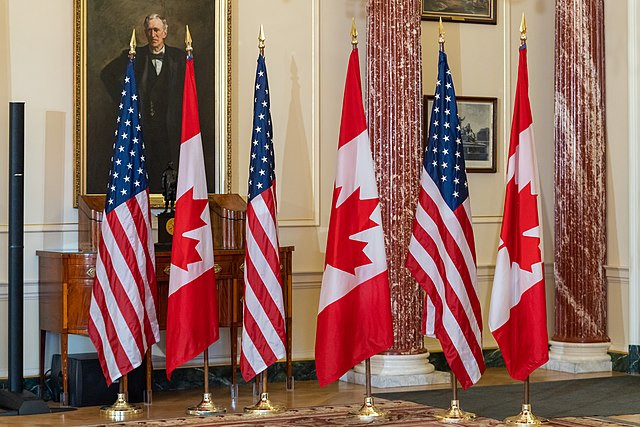Canada announced retaliatory tariffs on $21 billion worth of U.S. goods on Wednesday in response to President Donald Trump's broad-based steel and aluminum duties, marking a significant escalation in global trade tensions. The tariffs, set to take effect Thursday, include 25% levies on steel, aluminum, and a range of American imports such as computers, sports equipment, and cast iron products, according to Canadian Finance Minister Dominic LeBlanc.
The move follows Trump's implementation of 25% tariffs on steel and aluminum imports from all foreign suppliers, triggering immediate backlash from U.S. trading partners. The European Union announced its own countermeasures targeting $28 billion worth of American goods, while China signaled it was preparing to take similar action.
"This is much more than about our economy. It is about the future of our country," Canadian Foreign Affairs Minister Mélanie Joly said during a press conference. "Canadians have had enough, and we are a strong country."
The tariffs come on top of the $30 billion in countermeasures Ottawa imposed earlier in March, which remain in effect despite Trump issuing temporary exemptions on some trade duties following a stock market downturn. Trump's trade war has created widespread economic uncertainty, contributing to a significant decline in major stock indexes.
The economic fallout was evident Wednesday as U.S. stocks surrendered gains made earlier in the day following a positive inflation report. American automakers, in particular, saw share prices decline. Analysts at Barclays noted that when Trump enacted similar tariffs in the past, Ford and General Motors reported weakened profitability.
Trump has defended his tariff policies as essential to correcting trade imbalances and revitalizing domestic industries. "This is the beginning of making America rich again," the president said in a statement last month. The White House has justified the steel and aluminum tariffs on national security grounds, arguing that the U.S. has become too reliant on foreign suppliers for critical raw materials.
Despite those claims, economists warn that such protectionist policies could backfire. Tariffs, which are taxes on imports paid by U.S. businesses, are expected to increase costs for manufacturers and consumers alike. Critics argue that while some jobs may be created in the domestic steel and aluminum industries, many more could be lost in sectors that rely on competitively priced metals, such as automobile and appliance manufacturing.
The trade dispute with Canada is particularly consequential given that the U.S. and its northern neighbor share the world's largest bilateral trading relationship. Canada is the top foreign supplier of steel and aluminum to the U.S., making it a primary target of Trump's tariffs. The Canadian government has denounced the move as "completely unjustified, unfair and unreasonable."
"The U.S. administration is once again inserting disruption and disorder into an incredibly successful trading partnership and raising the costs of everyday goods for Canadians and American households alike," said François-Philippe Champagne, Canada's minister of innovation, science and industry.
The escalating conflict prompted Ontario Premier Doug Ford to meet with incoming Prime Minister Mark Carney before leading a Canadian delegation to Washington for trade talks with U.S. Commerce Secretary Howard Lutnick. Ford had previously announced plans to impose a 25% surcharge on electricity exports to three U.S. states in retaliation for Trump's tariffs, a move that further inflamed tensions between the two countries.
Trump had threatened to double tariffs on Canadian steel and aluminum to 50% in response to Ford's proposed surcharge. However, the U.S. president backed down from that threat after Ford announced he would pause the surcharge plan.
Meanwhile, Trump's rhetoric on Canada has taken an increasingly aggressive turn. He has repeatedly suggested that Canada should become the 51st U.S. state, a remark that has angered many Canadians. "The only constant in this unjustified and unjustifiable trade war seems to be President Trump's talks of annexing our country through economic coercion," Joly said.






